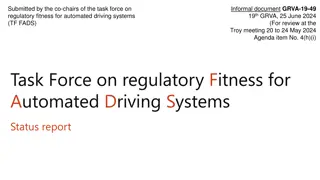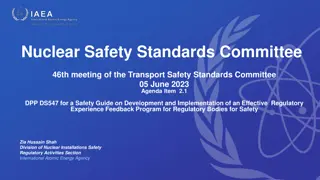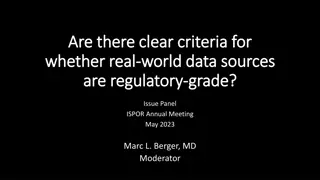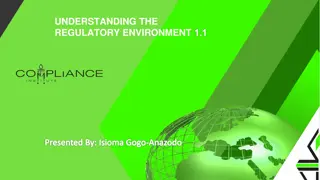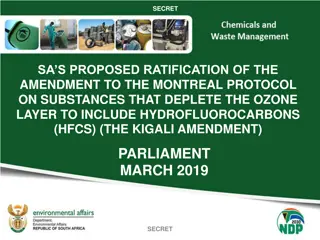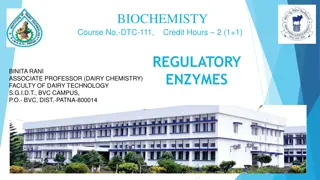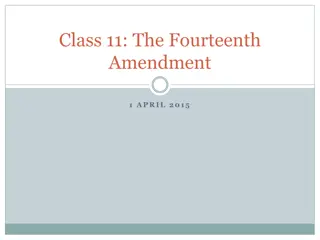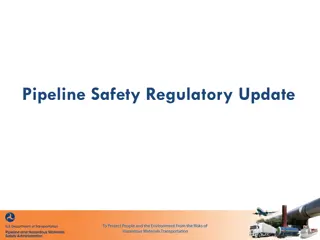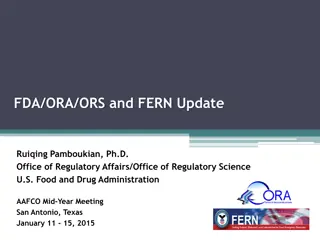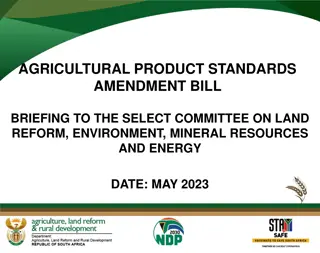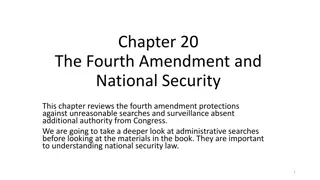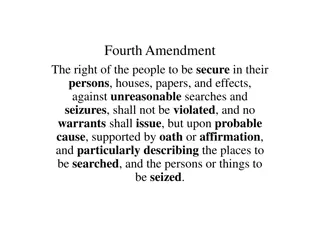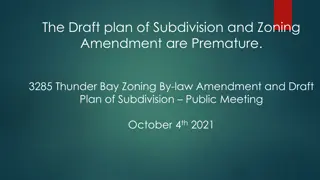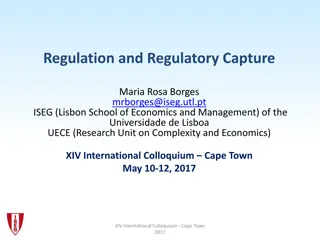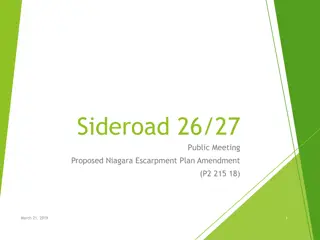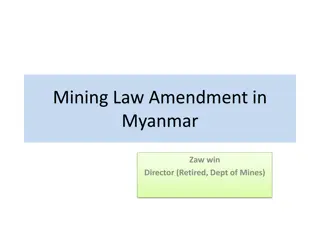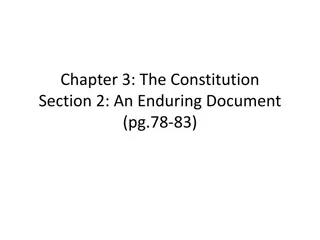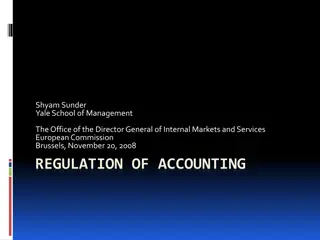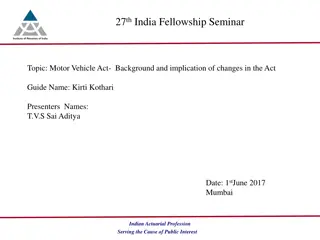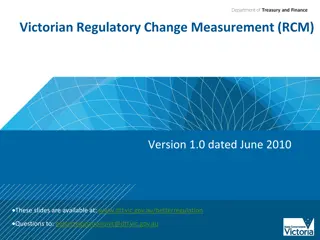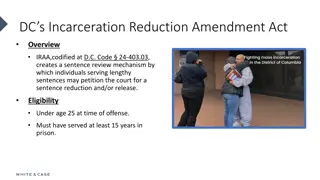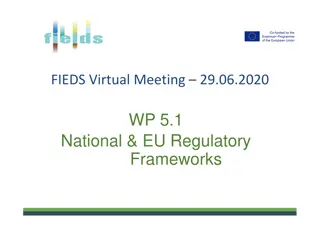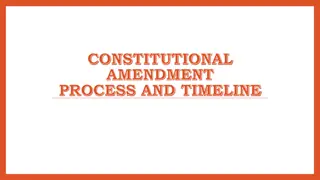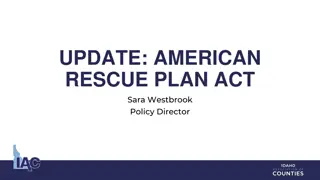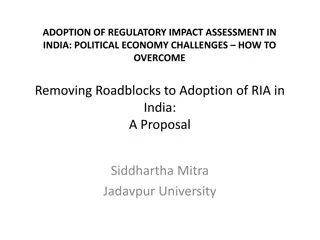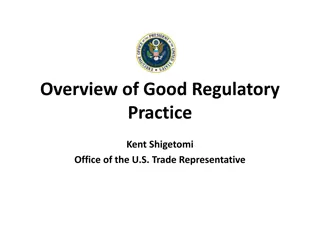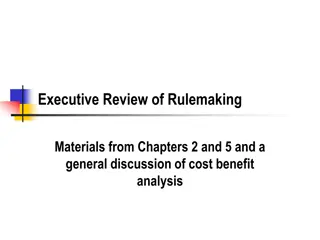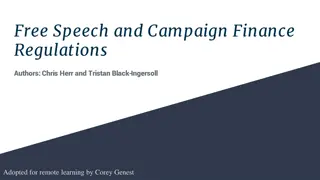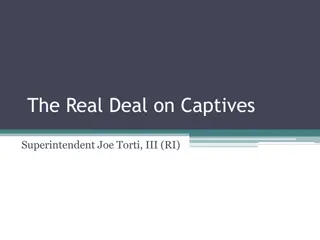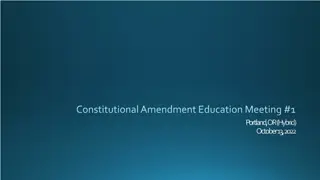National Small Enterprise Amendment Bill
Parliamentary Portfolio Committee on Small Business Development covers the National Small Enterprise Amendment Bill. It includes insights on the Small Enterprise Development Finance Agency, dispute resolution mechanisms, and transitional arrangements. The discussion highlights the importance of smal
3 views • 13 slides
RE: ELECTORAL MATTERS AMENDMENT BILL [ B42-2023]
Background information on the CLSO's considerations of the Electoral Amendment Act and Electoral Matters Amendment Bill, addressing legal and constitutional issues raised in public submissions. Important clauses critiqued include Clause 3, 7, 9, 18, 26, 31, and 31B in various Acts. Public concerns o
1 views • 30 slides
Amendment Bill 2023 for Drug-Free Sport in South Africa
The Amendment Bill 2023 aims to address non-compliant issues highlighted by WADA in the South African Institute for Drug-Free Sport Act. The bill underscores the importance of fair play, anti-doping regulations, and the well-being of athletes. It outlines the background, purpose, and steps involved
0 views • 24 slides
Responses to NYDA Amendment Bill Submissions Presentation
The presentation addresses the Department's responses to oral and written submissions on the NYDA Amendment Bill to the Portfolio Committee. It covers the purpose, background, and key points from the submission matrix regarding the establishment, functioning, age limits for board members, provincial
0 views • 26 slides
2023 Tax Legislation Overview
The presentation by National Treasury and SARS outlines the 2023 tax bills and legislative process. It covers adjustments in values, updates on tax rates, implementation of carbon tax, incentive reviews, and more. The content details various tax bills, including the Rates Bill, Revenue Laws Amendmen
2 views • 80 slides
Streamlining Business Licensing in Sarawak through Regulatory Experimentation
This initiative in Sarawak focuses on simplifying the business licensing process through regulatory experiments aimed at reducing regulatory burdens and improving the overall business ecosystem. By implementing innovative strategies such as risk-based approvals and composite licenses, the goal is to
0 views • 7 slides
Enhancing Corporate Transparency: Analysing The Companies Amendment Bill [B27B-2023]
The presentation delves into the Companies Amendment Bill [B27B-2023] and its implications on corporate transparency and accountability, especially regarding beneficial ownership information in companies with environmental impacts. The focus is on advocating for greater disclosures to uphold citizen
2 views • 9 slides
Regulatory Update Highlights and Priorities for ONR NGO Forum 2023
The Regulatory Update presented by Mark Foy, Chief Executive, and Chief Nuclear Inspector at the ONR NGO Forum highlighted key areas of focus including ethics, future strategies, and regulatory advancements in the nuclear industry. The forum also featured insights from Donald Urquhart, Executive Dir
3 views • 26 slides
Task Force Report on Regulatory Fitness for Automated Driving Systems
The co-chairs of the Task Force on Regulatory Fitness for Automated Driving Systems presented an informal document at the 19th meeting of GRVA, outlining the context, purpose, and status of regulations related to automated vehicles. The report focuses on the need for a regulatory environment for aut
1 views • 10 slides
Developing an Effective Regulatory Experience Feedback Program for Safety: A Guide for Regulatory Bodies
This Safety Guide aims to assist regulatory bodies in managing regulatory experience by identifying sources, establishing means for information exchange, and implementing record-keeping processes. It addresses the need for cooperation and knowledge sharing among regulatory bodies to enhance safety s
1 views • 9 slides
Clear Criteria for Assessing Regulatory-Grade Real-World Data Sources
The discussion at the ISPOR Annual Meeting focused on defining regulatory-grade real-world data (RWD) sources as those of adequate quality for specific regulatory purposes. Panelists emphasized the importance of authenticity, transparency, accuracy, and track record in evaluating data quality. They
2 views • 5 slides
Understanding the Regulatory Environment: A Comprehensive Overview
This session delves into the regulatory landscape focusing on the objectives, types, and origins of regulations in the financial sector, particularly in Nigeria. It discusses the essential role of regulation in promoting compliance, protecting stakeholders, and maintaining operational integrity with
1 views • 42 slides
Proposed Ratification of the Kigali Amendment to the Montreal Protocol
South Africa seeks Parliament's approval to ratify the Kigali Amendment to the Montreal Protocol, targeting the phase-down of hydrofluorocarbons (HFCs) to protect the ozone layer. The amendment requires new reporting on HFC production, imports, and exports, with different baselines for developing co
0 views • 10 slides
Understanding Gun Control and the Second Amendment Debate
The discussion on gun control and the Second Amendment is a contentious issue in the US, with frequent mass shootings leading to calls for stricter regulations. The Second Amendment guarantees the right to bear arms, but the high incidence of gun-related crimes raises concerns about public safety an
3 views • 31 slides
Understanding Regulatory Enzymes in Biochemical Pathways
Regulatory enzymes play a crucial role in controlling the activity of biochemical pathways by responding to the presence of specific molecules. They regulate the pathway's activity, ensuring that products are produced in the required amounts at different times. This article delves into the significa
5 views • 22 slides
Understanding the Fourteenth Amendment to the U.S. Constitution
The Fourteenth Amendment, ratified in 1868 after the Civil War, ensures citizenship for all persons born or naturalized in the United States. It prohibits states from making laws that violate citizens' privileges or deprive individuals of life, liberty, or property without due process. The amendment
0 views • 16 slides
Overview of Pipeline Safety Regulatory Updates
The Protecting our Infrastructure of Pipelines and Enhancing Safety Act of 2016 authorizes funding for PHMSA. Information on rulemakings can be found in DOT reports. The timeline for future rulemaking is pending on implementing Executive Orders. Enforcing the Regulatory Reform Agenda aims to allevia
1 views • 79 slides
Overview of FDA Office of Regulatory Affairs (ORA) and Office of Regulatory Science (ORS)
This information provides insights into the organizational structure and functions of the FDA Office of Regulatory Affairs (ORA) and the Office of Regulatory Science (ORS). It includes organizational charts, details about ORA laboratory locations, and the local structure of an ORA laboratory. Additi
1 views • 31 slides
Update on Agricultural Product Standards Amendment Bill Progress
The Agricultural Product Standards Amendment Bill is undergoing significant progress as of May 2023. The Bill has been adopted by the National Assembly and is now under consideration by the National Council of Provinces. Key deficiencies that led to the amendment include issues with definitions, aud
0 views • 20 slides
Understanding Fourth Amendment Protections: Balancing National Security and Privacy
This chapter delves into the Fourth Amendment protections against unreasonable searches and surveillance, emphasizing the importance of additional authority from Congress for such actions. It explores administrative searches, the cultural perceptions of searches pre and post-9/11, and the key princi
0 views • 77 slides
Understanding the Fourth Amendment: Search and Seizure Laws in the United States
The Fourth Amendment of the United States Constitution protects individuals from unreasonable searches and seizures by the government. It outlines the requirements for obtaining a search warrant, defines a reasonable expectation of privacy, and details the types of searches allowed without a warrant
0 views • 18 slides
Concerns Regarding Premature Draft Plan of Subdivision and Zoning Amendment
Issues highlighted in the premature draft plan of subdivision and zoning amendment include the lack of an official plan amendment, incomplete environmental impact study, concerns about zoning changes, stormwater management, existing structures on the property, parking deficiencies, and parkland dedi
0 views • 13 slides
Mitigation of Regulatory Capture in Economic Regulation
Regulation aims to correct market failures for societal welfare, but regulatory capture by interest groups can hinder regulatory actions. This work discusses economic theories on regulatory capture, forms of capture, and strategies to mitigate risks, emphasizing the public interest theory as a promo
0 views • 29 slides
Proposed Amendment for Sideroad 26/27 in Niagara Escarpment Plan - Public Meeting Overview
The public meeting on March 21, 2019, discussed a proposed amendment to the Niagara Escarpment Plan for Sideroad 26/27 in Clearview Township. The amendment aims to allow redevelopment of the road without changing land use designations. Consultation details and submission deadlines were provided for
0 views • 8 slides
Overview of Mining Law Amendment in Myanmar by Zaw Win, Retired Director from Dept. of Mines
The amendment to Myanmar's Mines Law in 2015 brought changes in definitions, permits, investments, regional committees, taxes, and duties. The merger of Ministries of Mines and Environmental Conservation into Ministry of Natural Resources and Environmental Conservation signaled continuity in the min
0 views • 32 slides
The Evolution of the U.S. Constitution: From Jefferson and Madison to Amendment Processes
Jefferson and Madison held differing views on amending the Constitution, highlighting the balance between adaptability and stability. Despite enduring challenges like slavery, the Constitution remains the oldest written constitution. The rigorous amendment process, outlined in Article V, reflects th
0 views • 10 slides
Challenges and Considerations in Regulatory Cooperation and Competition
Protecting consumers and investors through effective regulation of accounting and corporate financial reporting is crucial. Regulatory cooperation offers benefits like simplifying the regulatory environment and enforcing best practices. However, regulatory competition can uncover limits and the adva
1 views • 39 slides
Implications of 2017 Motor Vehicle Act Amendment
The 2017 Motor Vehicle Act Amendment focuses on reducing road accidents, providing speedy treatment to victims, and establishing a Motor Vehicle Accident Fund. It introduces several key objectives, amendments, and insertions like e-Governance, higher penalties, and improvements in licensing. The ame
0 views • 16 slides
Understanding the Victorian Regulatory Change Measurement (RCM)
The Victorian Regulatory Change Measurement (RCM) methodology introduced in June 2010 aims to measure reductions in regulatory burden through different categories such as administrative costs, substantive compliance costs, delay costs, and more. The RCM formula helps in calculating the total regulat
0 views • 63 slides
DC's Incarceration Reduction Amendment Act Overview
The DC's Incarceration Reduction Amendment Act (IRAA) provides a mechanism for individuals under the age of 25 at the time of offense, who have served at least 15 years in prison, to petition for sentence reduction or release. This Act is based on key US Supreme Court cases relating to the Eighth Am
0 views • 7 slides
National and EU Regulatory Frameworks for Training and Innovation Opportunities
Start/end date for WP5.1 initiative is M7-M24, led by CONFAGRI.PT and partners. The project aims to prepare the roll-out of deliverables at national and regional levels, focusing on regulatory frameworks, sustainability plan, and stakeholder engagement. Various organizations contribute to provide EU
0 views • 7 slides
Proposed Amendment for Minimum Turndown Level Protection in Electricity Grid Code
The presentation discusses the draft amendment to the Indian Electricity Grid Code regarding the minimum turndown level protection for generating stations. It suggests using Security Constrained Unit Commitment (SCUC) instead of SCED to ensure minimum turndown levels are met, as illustrated through
0 views • 5 slides
Constitutional Amendment Process and Timeline for Tribal Election
The process and timeline for a constitutional amendment in a tribal election conducted by the Bureau of Indian Affairs (BIA) includes registration deadlines, mailing of ballots, election challenges, and upcoming educational meetings. The amendment requires a 2/3 majority of registered voters and par
0 views • 6 slides
Update on American Rescue Plan Act and Cornyn-Padilla Amendment
Recent updates regarding the American Rescue Plan Act include the Interim Final Rule progress, revised reporting schedules, and the bipartisan Cornyn-Padilla Amendment passed by the Senate to enhance the Recovery Fund. The Treasury is actively reviewing public comments and adjusting deadlines for re
0 views • 11 slides
Challenges and Solutions in Implementing Regulatory Impact Assessment in India
This article explores the adoption of Regulatory Impact Assessment (RIA) in India, discussing the political economy challenges and strategies to overcome roadblocks. It outlines the working definition of RIA, addresses potential opposition from politicians and bureaucrats, and suggests ways to gener
0 views • 7 slides
Understanding Good Regulatory Practice in Trade Governance
Good Regulatory Practice (GRP) is a key aspect of regulatory policy that focuses on improving the quality and cost-effectiveness of domestic regulations. It involves internationally recognized processes such as impact assessment, regulatory transparency, participation, and accountability. The import
0 views • 22 slides
Comprehensive Analysis of Rulemaking in Regulatory Governance
The executive review delves into regulatory materials from various chapters, highlighting both successes and failures within the regulatory landscape. It explores the tension in rulemaking, public perception of risk, and the role of non-agency regulation in tort and compensation law. The discussion
0 views • 44 slides
Understanding the First Amendment and Campaign Finance Regulations
Delve into the intricacies of the First Amendment and campaign finance regulations through a series of thought-provoking questions, images, and resources. Explore the fundamental role of free speech in democracy, the impact of money on political speech, and the historical context of press freedom. E
0 views • 16 slides
Understanding Captive Insurance: Regulatory Challenges and Framework
Federal agencies express systemic concerns over captive transactions, emphasizing the importance of distinguishing between different types of captives. The NAIC Solvency Framework aims to establish a consistent baseline for accounting practices in the insurance industry while allowing for flexibilit
0 views • 14 slides
Constitutional Amendment Education Meeting #1 in Portland, OR (Hybrid) - October 13, 2022
The Constitutional Amendment Education Meeting #1 is set to take place as a federal election conducted by the Bureau of Indian Affairs. The timeline, process, amendment language, the ballot, and FAQs regarding the election are outlined, emphasizing key dates, requirements, and voting procedures for
0 views • 11 slides
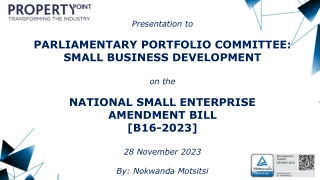
![RE: ELECTORAL MATTERS AMENDMENT BILL [ B42-2023]](/thumb/18837/re-electoral-matters-amendment-bill-b42-2023.jpg)

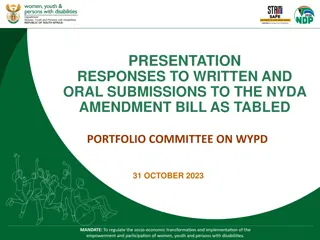
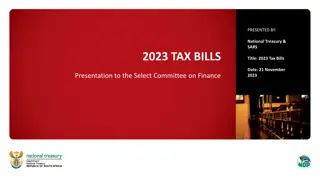
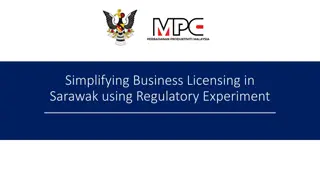
![Enhancing Corporate Transparency: Analysing The Companies Amendment Bill [B27B-2023]](/thumb/60028/enhancing-corporate-transparency-analysing-the-companies-amendment-bill-b27b-2023.jpg)

